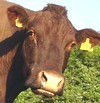Food Standards Agency reviews botulism rules for cattle farmers

Farmers with cattle herds affected by botulism will no longer be asked to restrict the movement of unaffected cattle following advice passed to the Food Standards Agency that found the current restrictions were over-precautionary.
Previously, the FSA’s advice was to request that the farmer voluntarily restricts the movement of cattle and does not send meat and milk from the affected herd into the food chain – this applied to both affected and healthy cattle.
Since 2003 there has been a marked increase in the incidents of suspected botulism within the UK, but a report from the Advisory Committee on the Microbiological Safety of Food concluded that, while the current restrictions on food from clinically affected cattle are appropriate and should remain in place, restrictions on unaffected cattle were over-precautionary.
This is because the botulinum toxin types in animals have rarely been associated with disease in humans. There is also little evidence of any human cases of botulism from meat and milk, as well as a lack of clinical cases of botulism occurring in suckler calves in affected herds.
The report therefore recommends that, in the absence of other signs, there should be no restrictions on milk or meat from healthy cattle from affected farms.
